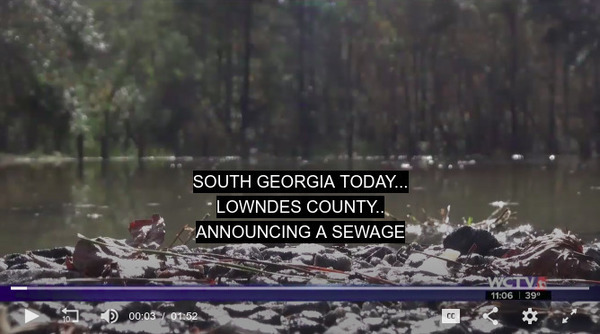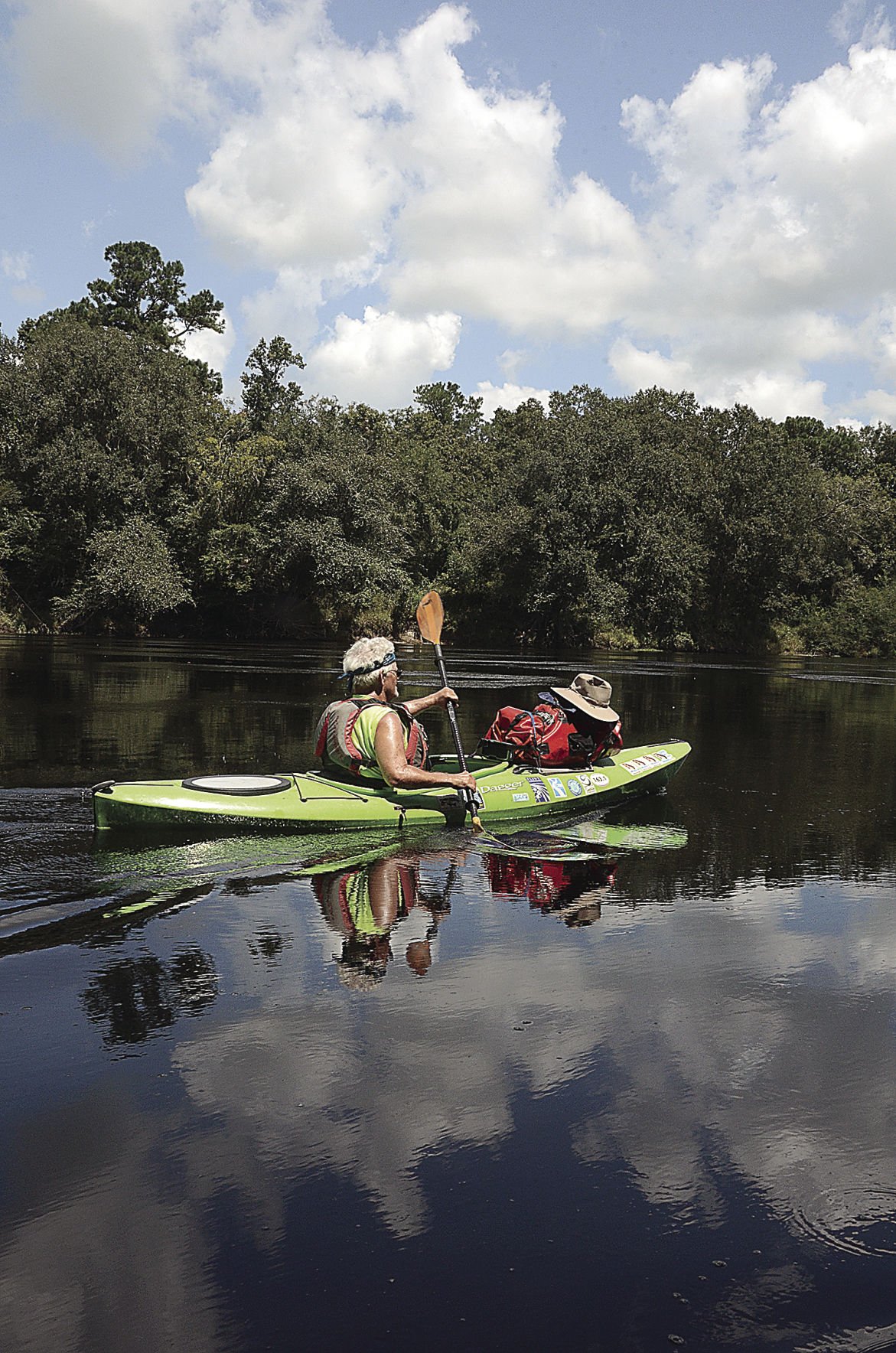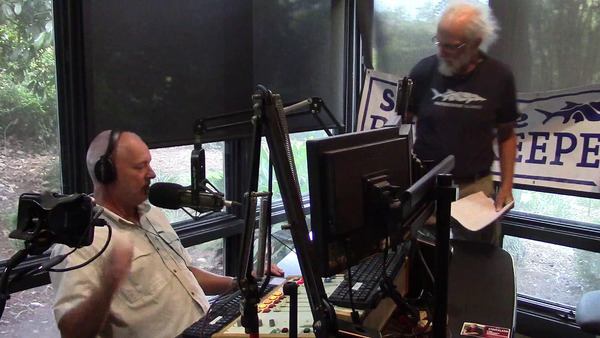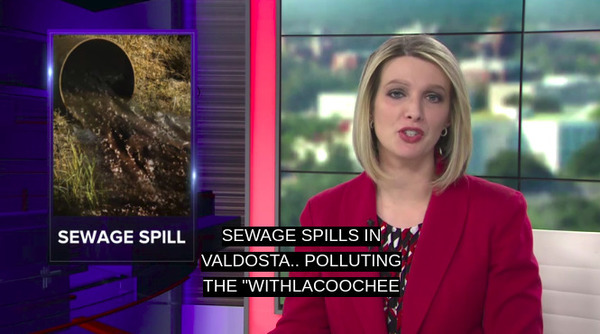News Stories about WWALS 2018.
For the rest see News.
-
2018-12-06: Emma Wheeler, WCTV, 6 December 2018,
Heavy rain causes sewage spill in Lowndes County
(WWALS blog post),
LOWNDES COUNTY, Ga. (WCTV) — More concerns about Withlacoochee River water safety arose after another sewage spill was reported in South Georgia.
…
- 2018-11-24:
Dinah Voyles Pulver, The Daytona-Beach News-Journal, 24 November 2018,
State geologist challenging springs action plan raised questions before
(WWALS blog post)
When groups across the state challenged new springs protection rules published by the Florida Department of Environmental Protection over the summer, one name stood out: Thomas Greenhalgh.
Greenhalgh, a hydrogeologist who works for the DEP’s Florida Geological Survey, surprised many by taking the rare step of challenging his own agency’s proposed action plan for improving water quality in the springs in the Suwannee River basin. That plan was one of 13 approved in June for springs that include Blue Spring in Orange City and Gemini Springs in DeBary. Echoing concerns voiced by Volusia County officials and environmental advocates, Greenhalgh’s letter stated the springs plans made claims that are “inaccurate and unsubstantiated.”
…
John Quarterman, the Suwannee River Riverkeeper, one of the groups challenging the proposed springs action plans, called Greenhalgh “a brave man.”
“I’ll give him that. And also, of course, he’s right,” said Quarterman, who recalls meeting Greenhalgh only once, at an event to do dye trace studies in a tributary to the Suwannee.
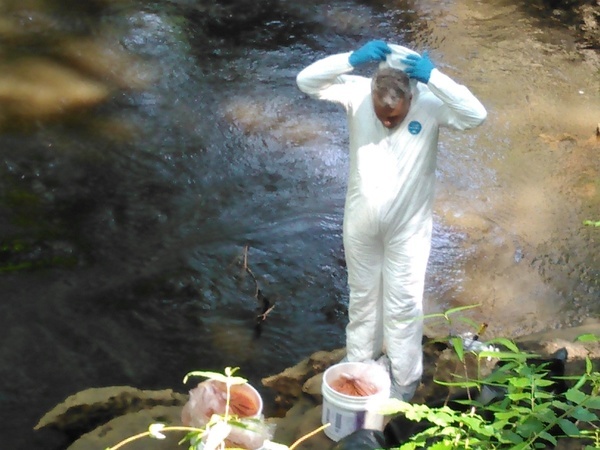
Photo: John S. Quarterman for WWALS, of Thomas Greenhalgh suiting up at the Alapaha Dye Test, 2016-06-22. -
2018-10-02:
Staff Reports, Moultrie Observer, 2 October 2018,
Georgia River Network plans cross-border journey in June,
ATLANTA — Georgia River Network’s annual Paddle Georgia event is going out of state in 2019 as the organization celebrates its 15th year of serving up week-long canoe/kayak/paddleboard adventures.
The statewide river advocacy organization announced earlier this month that Paddle Georgia 2019 will take place June 15-21 over 92 miles of the Withlacoochee and Suwannee rivers in far south Georgia and north Florida. It marks the first time that the annual event has crossed state boundaries.
…
Paddle Georgia 2019 will begin on the Little River near Valdosta. After launching, paddlers will immediately meet the Withlacoochee River and spend five days following its winding course through Georgia and into Florida. The final two days of the trip will descend the Suwannee River in Florida, ending June 21 near Mayo.
Both the Withlacoochee and Suwannee are known for the breathtakingly cold and scenic blue hole springs that feed into the blackwater rivers. Along the paddling route, participants will have the opportunity to dip their toes—or their whole bodies—in no less than a dozen of these springs that boil up through karst limestone from the Floridan aquifer.
Among the highlights will be Madison Blue Springs and Lafayette Blue Spring state parks in Florida.
And, though the Withlacoochee travels through flat land, the river does offer up some shoals along its route and is flanked in places by high limestone bluffs. The Suwannee, which has its beginning in Georgia’s Okefenokee Swamp, is also characterized by limestone bluffs.
…
Proceeds from this year’s event will support Georgia River Network and Suwannee Riverkeeper and the WWALS Watershed Coalition. Since its inception in 2005, GRN’s Paddle Georgia has introduced more than 4300 people to Georgia’s rivers while generating more than $430,000 for river protection.
-
2018-10-02:
Emma Wheeler, WCTV, 2 October 2018,
North Florida communities look to solve sewage spills in Valdosta,
(WWALS blog post)
“It has a negative impact on our livelihood,” said Madison County Commissioner Rick Davis. “It’s a health issue, it’s an environmental issue, it has a negative impact on our economy and it certainly negatively impacts our tourism.”
Madison County is now teaming up as part of the Regional Planning Council, which is made up of representatives from 12 North Central Florida counties. The group will be forming a task force to come up with a solution.
…
Organizers also want to see immediate notification when a spill occurs, which they believe is not yet happening. The WWALS Watershed Coalition is asking for the same.
“If you’re swimming in this river you don’t really want to know the fecal coliform is 100 times higher than the state limit, and that happens in this river sometimes in the summer,” said [Suwannee] Riverkeeper John Quarterman. “So, if that is happening no matter what the source we want to say, not safe, don’t swim.”
Over the last few years, the City of Valdosta has invested millions of dollars to improve the wastewater treatment plants, including building a new multi-million dollar facility in 2016.
“They’ve made a lot of progress, which is partly why it’s so frustrating to people. Why are they still spilling, they need to not be doing that,” Quarterman said.
Your organization can still ask GA-EPD to tell everyone when anyone spills.
-
2019-09-26: Dave Miller, WALB TV, 26 September 2018,
Paddle down Georgia’s great rivers:
Georgia River Network Plans Cross-Border River Journey for 15th Anniversary of Paddle GA,
ALBANY, GA (WALB) – Georgia River Network’s annual Paddle Georgia event is going out of state in 2019 as the organization celebrates its 15th year of serving up week-long canoe/kayak/paddleboard adventures.
The statewide river advocacy organization announced earlier this month that Paddle Georgia 2019 will take place June 15-21 over 92 miles of the Withlacoochee and Suwannee rivers in far south Georgia and north Florida. It marks the first time that the annual event has crossed state boundaries.
“As Georgians we’re kind of possessive about our rivers, but the reality is that many of the rivers that start here in Georgia are shared with our neighboring states,” said Joe Cook, Paddle Georgia Coordinator. “One of the themes of this journey from Georgia into Florida is that we have a responsibility to our downstream neighbors.”
Of Georgia’s 14 major river basins, half flow into neighboring states, including the Suwannee. Georgia has been embroiled in a 30-year dispute with Florida and Alabama over the use of the Chattahoochee, Flint, and Apalachicola rivers.
Paddle Georgia 2019 will begin on the Little River near Valdosta. After launching, paddlers will immediately meet the Withlacoochee River and spend five days following its winding course through Georgia and into Florida. The final two days of the trip will descend the Suwannee River in Florida, ending June 21 near Mayo.
Both the Withlacoochee and Suwannee are known for the breathtakingly cold and scenic blue hole springs that feed into the blackwater rivers. Along the paddling route, participants will have the opportunity to dip their toes— or their whole bodies— in no less than a dozen of these springs that boil up through karst limestone from the Floridan aquifer.
Among the highlights will be Madison Blue Springs and Lafayette Blue Spring state parks in Florida.
And, though the Withlacoochee travels through flat land, the river does offer up some shoals along its route and is flanked in places by high limestone bluffs. The Suwannee, which has its beginning in Georgia’s Okefenokee Swamp, is also characterized by limestone bluffs.
The route will take participants near the towns of Valdosta, Quitman and Lake Park, Georgia as well as Jennings, Madison, Live Oak and Mayo, Florida.
On the river by day, the paddlers will camp at nearby facilities where catered meals, educational programs, and entertainment will be served up nightly. In Florida, the group plans to camp at Advent Christian Village, a retirement community and retreat facility on the banks of the Suwannee. While many participants will tent camp, others will take advantage of the village’s hotel rooms and hostel-style sleeping facilities.
Organizers are still working to finalize accommodations for the journey’s first few days in Georgia.
Paddle Georgia is regarded at the country’s largest week-long canoe/kayak camping journey with 300 to 400 people participating each year. The purpose of the trip is to raise awareness of Georgia’s rivers and raise funds to protect those rivers.
Proceeds from this year’s event will support Georgia River Network and Suwannee Riverkeeper and the WWALS Watershed Coalition. Since its inception in 2005, GRN’s Paddle Georgia has introduced more than 4,300 people to Georgia’s rivers while generating more than $430,000 for river protection.
The trip is open to paddlers of all skill levels. Participants have ranged in age from 4 to 84. Registration for Paddle Georgia 2019 will open in early February. Registration fees range from $70 to $425. Registration options are available for the seven-day journey as well as two-day portions of the trip. For more information about Paddle Georgia visit: www.garivers.org/paddle_georgia
-
2018-09-13: Video: Paddle races, water trails, and Sabal Trail jury trials; Suwannee Riverkeeper on WGOV Radio
Thanks to Steve Nichols for having me on The Morning Drive with Steve Nichols, 105.9FM WVGA. We talked about water trails, paddle races, and the Sabal Trail pipeline federal eminent domain jury trials, which were being settled as we spoke. Also we hear the Naylor Boat Ramp will be finished soon by Lowndes County.
-
2018-08-21:
Emma Wheeler, WCTV,
Sewage spills prompt concern over Withlacoochee River safety (WWALS blog post),
MADISON, Fla. (WCTV) — A North Florida community is fighting for cleaner water.
Community members in Madison are pushing for safer waterways. It stems from concerns over sewage spills at Valdosta’s Withlacoochee Treatment Plant. The most recent of the spills happened in June.
Many of those concerned said their goal is to have no sewage spill into the river.
“These are public resources, they belong to us,” said Thomas Potter with the WWALS Watershed Coalition. “It’s our duty and our responsibility to make sure that they remain clean.”
…
Valdosta Utilities Director Darryl Muse said the city has treated about 2.2 billion gallons of sewer, recalling 300,000 to 400,000 gallons worth of releases. He said this puts the city at an over 99 percent success rate.
“I think most industries would be okay with .2 of one percent failure rate, but we’re not. We’re still working diligently, we want to get that number down as low as we can,” Muse said.
Others said that’s not enough.
“Hopefully these are small hiccups on the path to getting a system that essentially works flawlessly. In the meantime, these problems are still occurring,” Potter said.
-
2018-06-29:
Landowner wins over Sabal Trail in jury trial, jsq on Scott James radio 2018-06-29,
The just compensation for property takings required by the Fifth Amendment is not “just” compensation, said Scott James. And a jury of peers of a landowner told Sabal Trail to pay up five times what it offered for an easement for its fracked gas pipeline.
“…nor shall private property be taken for public use, without just compensation.”
—Fifth Amendment, U.S. Constitution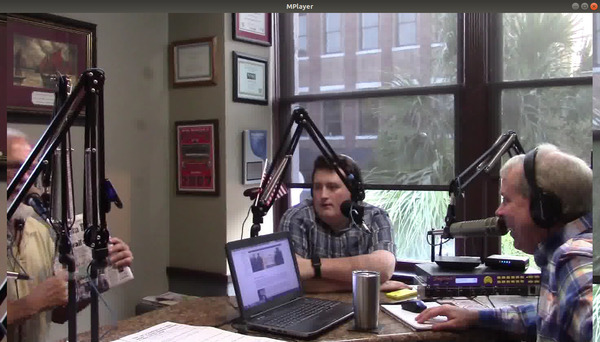
VDT front pageAnd five times is more just than before. But how is a one-time payment when the pipeline company will profit forever just? Especially when, by the Sabal Trail’s own appraiser’s estimate, the pipeline company took 85% of the rights for that easement, so while in principle the developer can still build a subdivision on that property, he can’t even build a road across that easement without the pipeline company’s permission.
-
2018-06-27:
Thomas Lynn, Valdosta Daily Times,
Sabal Trail ordered to pay:
Jury awards landowner five times pipeline offer
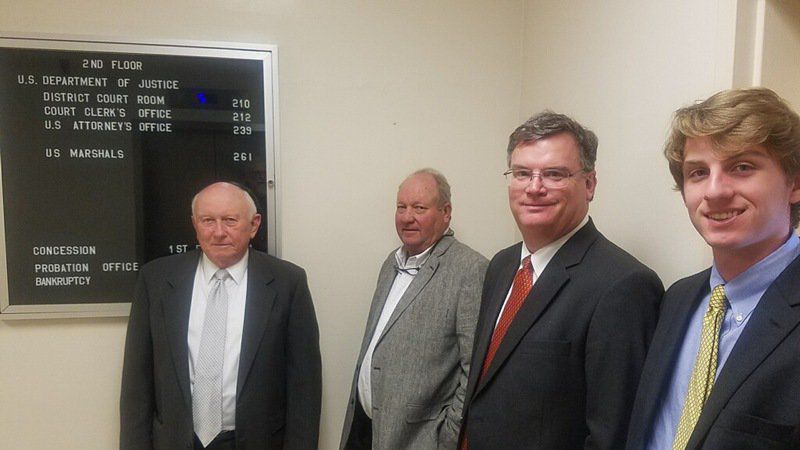
John S. Quarterman | Submitted Photo Lynn Lasseter and his attorney, Jonathan Waters, after a jury ordered Sabal Trail Transmission to pay Lasseter $103,385 in just compensation for land taken under eminent domain. -
2018-06-27: Emma Wheeler, WCTV, 27 June 2018,
Landowners, environmentalists celebrate ‘small victory’ over Sabal Trail (WWALS blog post)
LOWNDES COUNTY, Ga. (WCTV) — Landowners and environmentalists in South Georgia are celebrating a small victory in a case against Sabal Trail.
…
The Sabal Trail natural gas pipeline was granted eminent domain in order to run through some of the private properties along its path. In doing so, it was required to offer what the defense calls ‘just compensation.’
One Moultrie land owner was offered around $20,000 for an easement on his property. This week a jury sided with the land owner, deciding that was not enough.
Sabal Trail is now ordered to pay five times that amount to the property owner; more than $103,000.
The pipeline runs underground through private and public properties, as well as the Withlacoochee River. Environmental groups, like the WWALS Watershed Coalition, fear it will compromise the river, as well as public safety for nearby homeowners.
They said small victories like these are reasons to keep fighting, and rid pipeline companies of their sense of inevitability.
“There is something you can do. You can hold out and they’ll have to pay you a bunch more than they offered you. Okay, it didn’t stop the pipeline, but think about it, if they have to pay five times as much as they offered for every easement would they be able to afford to build a pipeline,” said Suwannee Riverkeeper John Quarterman. “This thing is not for public benefit. Why should someone in Moultrie, Georgia in this case, or all the people in Lowndes County, Georgia who had to give up easements, why should they have to give up easements for a few big companies to make a profit. They shouldn’t.”

-
2018-06-13:
Bruce Ritchie, Politico Pro, 13 June 2018,
Groups say they’re preparing challenge to natural gas exports from Florida (see also wwals.net/issues/lng/),
Environmental groups say they are raising money toward a lawsuit to be filed against the Federal Energy Regulatory Commission, charging that it is failing to regulate liquefied natural gas exports from facilities in Florida.
The WWALS Watershed Coalition, based in Hahira, Ga., is among the groups challenging the legality of the 515-mile Sabal Trail Transmission LLC pipeline, which was built in 2017 to move gas through Alabama and Georgia to Central Florida. The group says LNG shipments on Interstate 75, and from the Sabal Trail pipeline to export facilities in Florida, pose risks to communities.
“Sabal Trail and FERC said this gas was needed by the public and NOT for export, and that’s how they justified eminent domain,” Mike Roth, president of Our Santa Fe River, said in an announcement. “To risk wetland destruction for private corporate gain is just wrong; to take private land to allow the companies to export fuel rattles the foundations of our democracy.”
-
Jason Nail, NailTravels, 26 April 2018,
Wanee Festival ’18: It’s Time To Panic,
As we move ever close to the environmental consciousness of festivals like Telluride and Rockygrass, we’re starting to see more advocacy groups devoting their time to Wanee.
 WWALS is a nonprofit
educational corporation advocating for watershed conservation and
stewardship of the Withlacoochee, Willacoochee, Alapaha, Little and
Suwannee Rivers. Mad props to WWALS Watershed Coalition, Inc. for
their work with the
Alapaha River Water Trail and the
First Annual
Suwannee Riverkeeper Songwriting Contest. These are perfect reasons
to get involved. Visit their
website
for upcoming outings and events or email them at wwalswatershed@gmail.com and contact@suwanneeriverkeeper.org.
WWALS is a nonprofit
educational corporation advocating for watershed conservation and
stewardship of the Withlacoochee, Willacoochee, Alapaha, Little and
Suwannee Rivers. Mad props to WWALS Watershed Coalition, Inc. for
their work with the
Alapaha River Water Trail and the
First Annual
Suwannee Riverkeeper Songwriting Contest. These are perfect reasons
to get involved. Visit their
website
for upcoming outings and events or email them at wwalswatershed@gmail.com and contact@suwanneeriverkeeper.org.
-
Carmella Guiol, Kate Bradshaw, Creative Loafing Tampa Bay, 15 Feb 2018, (WWALS blog post), The experts were right: Troubles for the Sabal Trail pipeline: They warned us — correctly — about the pipeline’s dangers to the environment. ,
For years, environmentalists warned against constructing the Sabal Trail pipeline. Yet construction wore on, and the controversial natural gas conduit is functional — for now.

Photo: Terrence Smith. TOLD YA SO: In St. Petersburg, protesters railed against the controversial project in 2017.…“Without the certificate, they cannot operate,” says John Quarterman, president of the WWALS Watershed Coalition….

